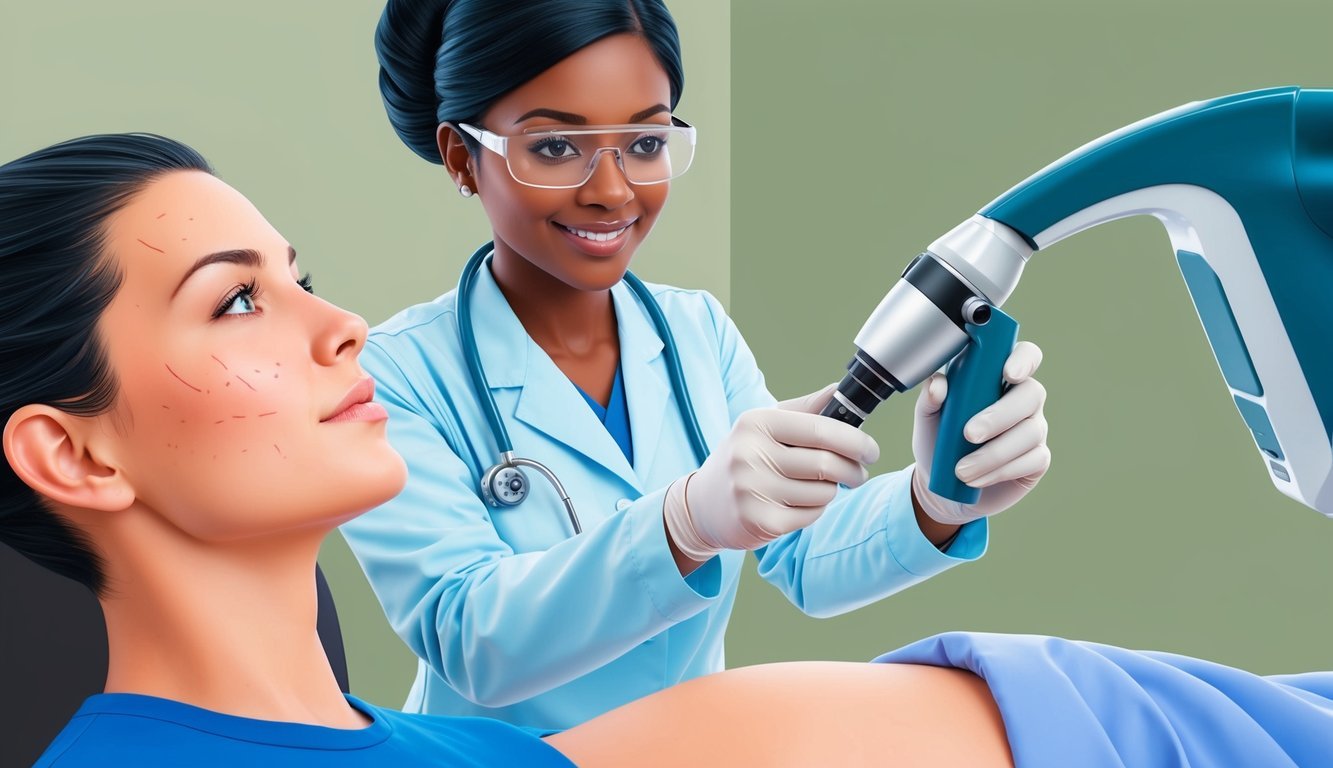As a vital part of the healthcare system, a dermatology nurse practitioner plays a crucial role in maintaining skin health. These advanced practice registered nurses specialize in diagnosing and treating various skin issues, from simple rashes to complex skin cancers. With their advanced training, dermatology nurse practitioners also educate patients on proper skin care and preventative measures, making them key players in promoting overall wellness.
To become a dermatology nurse practitioner, you will need specialized education and clinical training.
This pathway typically begins with earning a registered nursing degree, followed by a master’s or doctoral degree focused on dermatology.
Your continued professional development will enhance your skills and increase your opportunities in this growing field, where demand for skin health specialists continues to rise.
With an increasing awareness of skin health and cosmetic needs, dermatology nurse practitioners are in high demand.
The career offers various opportunities to engage with patients and improve their quality of life through effective treatment and guidance.
Key Takeaways
- Dermatology nurse practitioners focus on diagnosing and treating skin conditions.
- Specialized education and training are essential for this career path.
- There are many opportunities for professional growth in the field of dermatology.
Educational Pathways

To become a dermatology nurse practitioner, you need a strong educational background, starting from your undergraduate studies to advanced graduate degrees.
Each step is crucial for your development and qualification in this specialized field.
Undergraduate Studies
Your journey begins with a Bachelor of Science in Nursing (BSN).
This undergraduate program provides essential nursing skills and knowledge necessary for patient care.
During your BSN, you’ll cover various subjects, including anatomy, pharmacology, and clinical nursing practices.
After completing your BSN, you must pass the National Council Licensure Examination (NCLEX-RN) to become a registered nurse (RN).
This licensure is mandatory for practicing nursing and ensures you meet the profession’s standards.
Many entry-level positions in nursing will require this licensure.
Gaining experience as an RN will prepare you for the next steps in your career.
Graduate Studies
Once you are an RN, the next step is pursuing advanced education.
You can choose to pursue a Master of Science in Nursing (MSN) or a Doctor of Nursing Practice (DNP).
The MSN programs generally offer specialized tracks, including dermatology.
These programs will focus on advanced clinical skills, leadership, and research.
Coursework will often include dermatology-specific topics that are vital for your future role.
The DNP is a terminal degree that adds an extra layer of expertise, preparing you for leadership roles in healthcare.
Both programs are essential for advancing your practice and specialty knowledge.
Licensure and Certification
After completing your graduate studies, you need to obtain certification as a dermatology nurse practitioner.
The Dermatology Nurse Practitioner Certification Board (DNPCB) offers a Dermatology Certified Nurse Practitioner (DCNP) certification.
To qualify for this certification, you must demonstrate adequate clinical experience and pass a comprehensive exam.
Specialty certification is vital for proving your proficiency in dermatological care and can enhance your job prospects significantly.
Pursuing these licensure and certification paths demonstrates your commitment to high standards of care in dermatology, establishing you as a qualified professional in this niche.
Clinical Skills and Competencies

As a dermatology nurse practitioner, you are expected to possess a wide range of clinical skills and competencies.
This section highlights essential areas including general dermatologic care, procedural expertise, and insights into dermatopathology and dermoscopy.
General Dermatologic Care
Your role begins with a strong foundation in general dermatologic care.
This includes assessing and managing various skin conditions such as eczema, psoriasis, and acne.
You need to perform detailed skin examinations and create individualized treatment plans.
A big part of your work involves educating patients about their conditions and preventive care.
You will guide them on skincare routines and photoprotection strategies.
Being adept in skin biopsies is crucial.
You should understand when to perform biopsies for accurate diagnosis.
Techniques like punch or excisional biopsies will often be utilized.
For more details on biopsy techniques, you can refer to Dermatology Nursing: Scope and Standards.
Procedural Expertise
Procedural expertise is vital for performing various dermatological interventions.
You should be trained in cryotherapy for treating warts and precancerous lesions using liquid nitrogen.
This technique allows for targeted destruction of abnormal tissue.
Additionally, mastering phototherapy is important for managing conditions like psoriasis and vitiligo.
You will utilize both narrowband UVB and PUVA therapy to improve patient outcomes.
You will also perform cosmetic procedures such as Botox injections and fillers.
Familiarity with facial anatomy is essential to minimize complications.
You should stay updated on the latest guidelines for these procedures to ensure patient safety.
Dermatopathology and Dermoscopy
Understanding dermatopathology is key to diagnosing skin disorders effectively.
You need to interpret histological samples and correlate findings with clinical presentations.
This expertise enables you to identify conditions like melanoma and other skin cancers at an early stage.
Dermoscopy is another essential skill.
This technique enhances your ability to examine skin lesions in detail.
You must be able to differentiate between benign and malignant lesions using dermatoscopes.
Being proficient in these areas not only increases your diagnostic accuracy but also boosts patient confidence in your clinical judgments.
For more comprehensive resources, consider checking out competencies for dermatology nurse practitioners.
Professional Development

As a dermatology nurse practitioner, you must prioritize your professional development to stay current in the field.
This includes engaging in continuing education, attending conferences for networking, and seeking mentorship opportunities.
Continuing Education
Continuing education (CE) is vital for maintaining your license and improving your knowledge base.
You can earn CE credits through various programs offered by organizations such as the Dermatology Nurses’ Association and the National Academy of Dermatology Nurse Practitioners.
Courses may cover clinical skills, new treatments, and dermatology trends.
You might choose online courses, webinars, or in-person classes, allowing flexibility in how you learn.
Make sure to track your CE credits to meet state licensing requirements and enhance your career opportunities.
Conferences and Networking
Attending conferences provides you with excellent networking opportunities.
Events organized by the Dermatology Nurses’ Association and similar groups allow you to meet other professionals, share experiences, and learn from experts.
Conferences often include workshops, presentations, and panel discussions.
This exposure can keep you informed about the latest research and practices in dermatology.
Engaging with peers can lead to valuable connections that might help you in your clinical practice.
Mentorship and Fellowships
Mentorship can be a crucial part of your professional journey.
Building relationships with experienced dermatology practitioners can provide guidance, support, and insight into advanced practices.
You may also consider applying for dermatology fellowships, which offer in-depth training.
These programs help you refine your skills further and gain specialized knowledge.
Developing a strong mentorship network can lead to new opportunities and enhance your professional growth.
Career Opportunities
As a dermatology nurse practitioner, you have a variety of career opportunities in different healthcare settings and specialized practice areas.
These options allow you to focus on specific interests and provide care for various skin-related conditions.
Healthcare Settings
You can work in multiple environments, each offering unique experiences.
Some common settings include:
| Setting | Description |
|---|---|
| Dermatology Clinics | Focus on skin conditions like acne, eczema, and psoriasis. |
| Hospitals | Provide care for patients with severe skin issues or emergencies. |
| Private Practice | Offer personalized care in a more intimate setting. |
| Medical Spas | Focus on cosmetic procedures and skin rejuvenation treatments. |
In these settings, your role can vary from conducting assessments to developing treatment plans.
You might work directly with patients, aiding in diagnosing and managing conditions such as skin cancer or chronic rashes.
Specialized Practice Areas
You may also choose to specialize in specific areas of dermatology:
- Pediatric Dermatology: Work with children to treat conditions like diaper rash or genetic skin disorders.
- Cosmetic Dermatology: Perform aesthetic procedures, including laser treatments and injectables to enhance appearance.
- Skin Cancer Care: Focus on prevention, early detection, and treatment of skin cancers, working with multidisciplinary teams.
By specializing, you can make a significant impact on patient lives, addressing both medical and cosmetic skin issues.
Your expertise will be valuable in improving health outcomes and patient satisfaction in these focused areas.
The Dermatology NP in Practice

Dermatology Nurse Practitioners (NPs) play a vital role in delivering specialized skin care.
They focus on patient-centered approaches and provide care within a defined scope of practice, addressing various dermatological issues.
Patient-Centered Care
In dermatology, patient-centered care means prioritizing the unique needs of each individual.
As a Dermatology NP, you assess and develop treatment plans tailored to your patients’ specific skin conditions.
This includes conditions like acne, eczema, and psoriasis.
You engage with patients by taking detailed medical histories and offering education on skincare routines.
Many Dermatology NPs also provide counseling on lifestyle factors that affect skin health.
By emphasizing communication, trust, and empathy, you create a comfortable environment for discussing sensitive issues.
Furthermore, your clinical experience allows you to implement evidence-based practices.
This ensures that patients receive the most effective treatments.
Collaborating with dermatologists and other healthcare professionals enhances the quality of care, leading to better patient outcomes.
Scope of Practice
As a Dermatology NP, your scope of practice is dictated by state regulations.
Typically, this includes performing examinations, diagnosing conditions, and prescribing medications.
You may also conduct skin biopsies and manage dermatologic surgeries.
To maintain your certification, you should pursue continuing education opportunities.
The Dermatology Nurse Practitioner Certification (DCNP) is one such credential that validates your expertise in this specialized field.
The skills you develop in your practice are essential for addressing a range of dermatological issues.
These skills include understanding dermatoscopic techniques, performing minor procedures, and staying updated on advances in dermatologic care.
By adhering to these standards, you ensure that your patients receive high-quality care tailored to their specific needs.
For additional resources on dermatologic care, consider visiting the American Association of Nurse Practitioners.
Frequently Asked Questions
In this section, you will find details about the qualifications, responsibilities, salary comparisons, and educational structure for dermatology nurse practitioners.
Additionally, insights into independence, job opportunities, and geographic factors will be covered.
What qualifications are needed to become a dermatology nurse practitioner?
To become a dermatology nurse practitioner, you must first obtain a Bachelor of Science in Nursing (BSN).
After that, you need to become a registered nurse (RN) and complete a Master’s or Doctorate degree in nursing.
Many also seek certification in dermatology, which demonstrates expertise in this area.
How does the salary of a dermatology nurse practitioner compare with other specialties in nursing?
Dermatology nurse practitioners generally have competitive salaries.
On average, they earn between $90,000 and $120,000 per year, depending on experience and location.
This is comparable to other advanced practice nursing specialties, but can vary based on demand in specific regions.
What are the primary responsibilities of a nurse practitioner in dermatology?
Your main responsibilities as a dermatology nurse practitioner include diagnosing skin conditions, prescribing treatments, and performing procedures.
You will also focus on educating patients about skin care and preventive measures.
Working in collaboration with dermatologists may also be a part of your role.
Can a dermatology nurse practitioner operate independently, or must they work under a dermatologist?
The ability to operate independently varies by state.
In some states, nurse practitioners have full practice authority, allowing you to diagnose and treat patients without supervision.
In others, you may need to work under a dermatologist or have a collaborative agreement.
What is the typical duration and structure of educational programs for aspiring dermatology nurse practitioners?
The educational path typically takes about 6 to 8 years.
This includes obtaining a BSN, becoming an RN, and pursuing a Master’s or Doctorate in nursing.
Many programs offer specialized courses in dermatology to prepare you for this field.
How do job opportunities for dermatology nurse practitioners differ based on geographic regions?
Job opportunities vary by location.
Urban areas often have a higher demand for dermatology nurse practitioners.
States with a high population density may offer more positions, while rural areas might have fewer opportunities.
It’s important to research your specific region for the best employment prospects.

